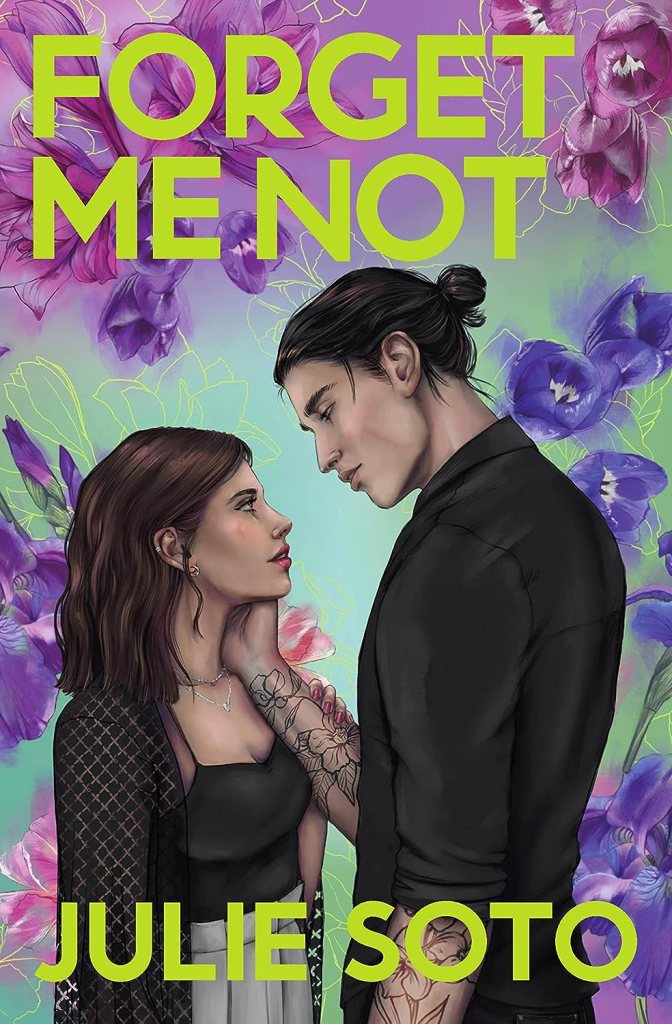Forget Me Not is a romantic tale that I picked up at the library and had to include here. The story is very well written with a plot that had me rooting for both lead characters and turning the page to see if they’d finally end up together. One’s a florist, the other a wedding planner, and you can’t get more romantic than that. Author Julie Soto does a captivating job of weaving just enough spicy scenes with conflict over a big wedding that could set them both up for promising professional futures. You’ll have to pick this one up to see if or how they work it out.
In this blog, I offer a different type of book review — one that’s combined with vocabulary building. Included below are a few interesting flower/plant names I found in Forget Me Not. Julie Soto included several of them, and I found myself looking them up for images after a few scenes. Not until the scene was over, I couldn’t stop reading!
The definitions here are for just a few words from Forget Me Not that, as it turns out all start with A, and I found them interesting:

astilbe: noun. an Old World plant of the saxifrage family, with plumes of tiny white, pink, or red flowers. ORIGIN — modern Latin, from Greek a- ‘not’ + stilbē, feminine of stilbos ‘glittering’ (because the individual flowers are small and inconspicuous).
From Forget Me Not: “I built a chandelier by suspending a rectangular tray from the ceiling in the back room with a lightweight chain. I filled it with pink baby’s breath and feathery blush flowers from an astilbe.”
amaranth: noun. 1 any plant of the genus Amaranthus, typically having small green, red, or purple-tinted flowers. Certain varieties are grown for food. Family Amaranthaceae: several genera, especially Amaranthus 2a purple color. 3an imaginary flower that never fades. ORIGIN — mid 16th century: from French amarante or modern Latin amaranthus, alteration (on the pattern of plant names ending in -anthus, from Greek anthos‘flower’) of Latin amarantus, from Greek amarantos‘ not fading’.
From Forget Me Not: “I shrug. ‘There are so few A-M-A words in the world. Amaranth?’
‘You are conveniently forgetting amazing. What is Amaranth?’
‘I didn’t forget; I disregarded. Amaranth is a plant. Drooping pink flowers that I use in bouquets sometimes.’”
amaryllis: noun. a bulbous plant with white, pink, or red flowers and strap-shaped leaves, of the type genus of the amaryllis family, Amaryllidaceae. A South African plant (Amaryllis belladonna, also called belladonna lily), and (popularly) a tropical South American plant that is frequently grown as a houseplant (hybrids of the genus Hippeastrum, formerly Amaryllis) ORIGIN — modern Latin, from Latin Amaryllis(from Greek Amarullis), a name for a country girl in pastoral poetry.
From Forget Me Not: “‘Amaryllis,’ I say, my voice soft in the quiet shop. I lift my eyes to her, and she’s pressing her lips together, a blush on her cheeks, a stain on her neck as vibrant as the Red Pearl amaryllis. ‘Is your mother a fan of musicals, or…?’
Her eyes sparkle again. ‘How does someone like you know a minor character from The Music Man.’”
Definitions are typically from the dictionary that comes with my Mac or The New Oxford American Dictionary.
“The word is only a representation of the meaning; even at its best, writing almost always falls short of full meaning. Given that, why in God’s name would you want to make things worse by choosing a word which is only cousin to the one you really wanted to use?” ― Stephen King, On Writing: A Memoir of the Craft.


